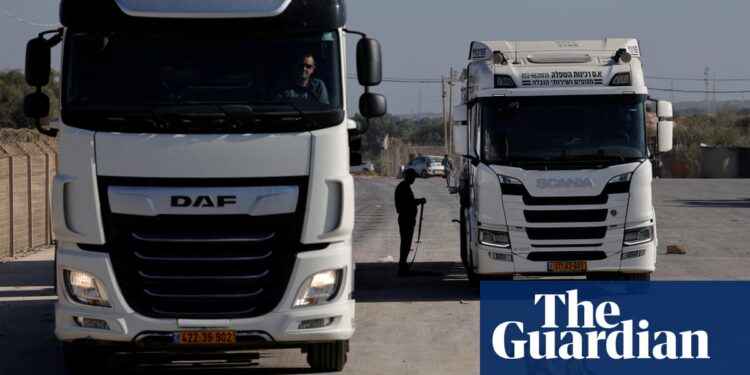The UN’s agency for Palestinian refugees has suspended aid deliveries through the main lifeline for the Gaza Strip after a fresh attack by armed gangs on a convoy, amid a severe food crisis caused by more than a year of fighting between Israel and Hamas.
In a statement on Sunday, Philippe Lazzarini, the head of Unrwa, said several trucks carrying food supplies were looted the day before on the road from Kerem Shalom on the border with Israel – the main aid crossing point into the besieged Palestinian territory. The route has not been safe for months, he said on X, referring to the unprecedented hijacking of nearly 100 aid trucks last month.
“This difficult decision comes at a time hunger is rapidly deepening … due to the ongoing siege, hurdles from Israeli authorities, political decisions to restrict the amounts of aid, lack of safety on aid routes and targeting of local police. All of the above led to a breakdown in law and order,” he said.
Lazzarini said protecting aid workers and supplies was Israel’s responsibility as the occupying power in the Palestinian territories, calling on the country to “ensure aid flows into Gaza safely” and to “refrain from attacks on humanitarian workers”.
An Israeli airstrike on Saturday in Khan Younis killed three contractors working for World Central Kitchen, Palestinian media reported, leading the US-based charity to also pause operations. The Israeli military said one of the World Central Kitchen employees was a Hamas militant involved in the 7 October attacks that triggered the war. It did not provide evidence to support the claim. The aid organisation lost another seven workers in an Israeli drone strike in April that Israel said was a mistake.
Humanitarian agencies working in Gaza have struggled to collect and distribute supplies amid Israeli military activity, blocks on movement, and Israeli attacks that have targeted employees, suspending operations on several occasions.
As of October, 333 aid workers had been killed since the conflict began, according to the UN. The world body estimates that about one-third of aid is stolen by armed gangs who resell it at extortionate prices.
Israel denies deliberately restricting aid to Gaza or ignoring the proliferation of gangs and organised crime. It also accuses Hamas of diverting aid.
The Palestinian militant group denies that, in turn alleging Israel has tried to foment anarchy by systematically targeting Hamas-employed police guarding aid convoys.
At least 32 people were killed in Israeli strikes across the enclave in the past 24 hours, even as Hamas leaders met Egyptian security officials in Cairo on Sunday to discuss reviving ceasefire talks. The Biden administration is seeking to build on the success of last week’s ceasefire between Israel and the Lebanese group Hezbollah, although there is no indication yet from either Hamas or Israel that their terms for a truce have changed.
About 44,300 Palestinians have been killed in more than a year of fighting according to the local health ministry, whose figures are considered by the UN to be accurate, and 90% of the 2.3 million population have been displaced from their homes.
A total of 1,200 Israelis were killed and another 250 taken captive in the Hamas attack on Israel on 7 October 2023. Israel says 63 of the remaining 101 hostages are still alive.
Meanwhile, the Lebanon ceasefire appeared to be on shaky ground as both sides accused the other of new violations. The Israeli military carried out airstrikes in four areas on the Syria-Lebanon border on Saturday against what it said was military infrastructure and Hezbollah activities that “posed a threat”. The Syrian border is a key weapons supply route for the Iran-allied group.
Lebanon’s health ministry said that an Israeli “strike on a car in Majdal Zoun wounded three people including a seven-year-old child”.
Israeli warplanes also targeted what the military claimed was a rocket storage facility on Thursday, reportedly hitting a location north of the Litani River, which is not included in the 60-day ceasefire and staged withdrawal agreement.
Israeli forces have also aimed gun and tank fire at cars and people returning to areas near the UN-demarcated blue line separating the two countries, which Israel still considers restricted. Thousands of displaced civilians have attempted to return to their homes in southern Lebanon in the past few days amid contradictory instructions from Lebanese and Israeli officials.







